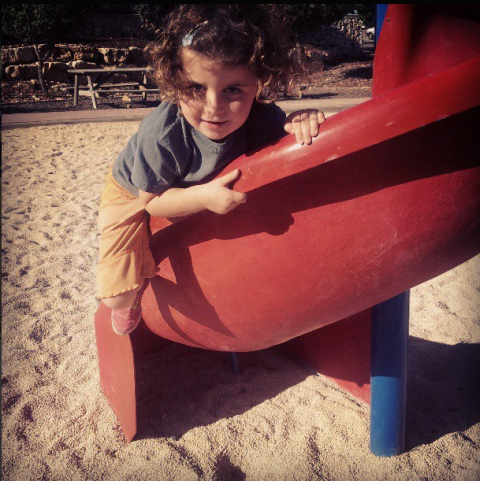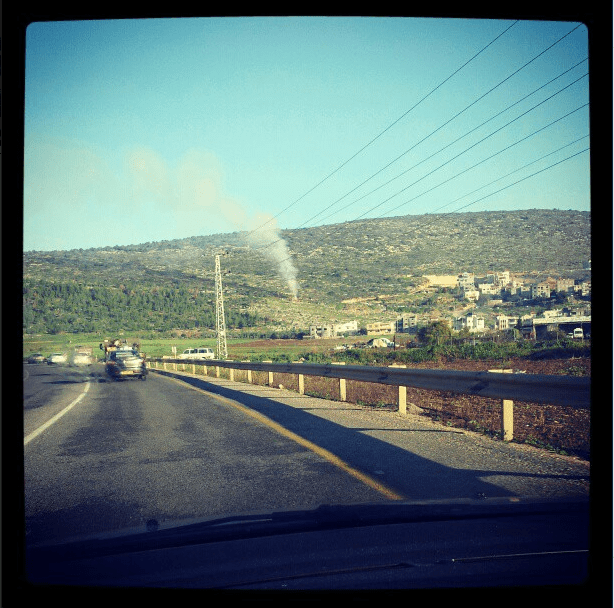There is nothing like a lifecycle event to open my heart. Combined with the penetrating power of song and prayer, these moments make me so feel so vulnerable, so very aware of our humanity, of life’s fragility.
Since we moved to Hannaton in late 2010, I’ve been present for six bar or bat mitzvahs, five brises or baby namings. I’ve cried at all of them. Sometimes I’ve cried, too, at Shabbat services during the mishaberach prayer for the ill or during a minyan enabling one of my neighbors to say the mourner’s kaddish. Seven have lost a parent since I’ve lived here.
This past weekend — as our oldest child became a bar mitzvah in the synagogue on Kibbutz Hannaton — it was our family’s turn to be at the center of the community’s attention. My body still reverberates the joy that filled every inch of it on Saturday, as our friends and family welcomed my son into symbolic “adulthood.” At some later date, I might share my reflections on the immense gratitude I feel in response to the volunteer efforts of our friends and extended family so we could simply be present for this occasion. It was a gift like no other.
For family and friends who were not able to attend, and for readers of this blog, below is the dvar torah (a reflection on the weekly chapters of Torah read this past Shabbat) I offered to the community on Friday night in advance of the bar mitzvah. The torah portion, the beginning of Shemot, should be familiar even to non-Jews as it’s the story that is the basis for the film, The Ten Commandments.
I welcome your own reflections in the comments.
If Moshe had a bar mitzvah, I wonder what language he would have given the dvar torah in?
We learn in the parsha this week, that Moshe was a Hebrew by birth and in his early years, as he is nursed by his mother, is part of his Hebrew family’s household. Presumably, he learns their language, their traditions; becomes accustomed to them. But — though, we don’t know when exactly — Moshe leaves his early home and grows up in the royal palace, among Egyptian family, and Egyptian friends.
It could be, if Moshe had to give a dvar torah in young adulthood, he might have preferred to speak in his Egyptian language. This was a revelation to me, and a comfort. That Moshe — one of our greatest heroes — was also a person who lived between two languages, two identities.
We also know Moshe questioned his ability to speak in front of a crowd, to be able to move the people God intended him to move. He says to God in chapter 4:
“God, I am not a man of words … for I am slow of speech, and of a slow tongue.”
Maybe that difficulty with speech had something to do with his living between languages.
Recently, inside an old cardboard box, I found the dvar torah from my own bat mitzvah There it was, my speech, typed up and printed out on 1980s IBM printer paper, marked up first in red by the rabbi and then in blue in my mom’s cursive handwriting.
I read the speech. The words didn’t sound like they came from me. They were the rabbi’s words, and my mother’s. But not mine, not really.
I wondered then, reading my speech from 1987: Do we even have our own words at 13?
Of course we do. Except everyone is trying their hardest to make us say everything else but what we really want to say. They’re trying to shape our words in the same way they’re trying to shape us. In the hopes we’ll grow into smart, kind, loving, good people.
They — our often well-meaning parents, teachers, rabbis — might say to our face, “We love you just the way you are.” But then they act — we act — in a way so counter to this statement. We monitor and evaluate our children’s behavior, we narrate and judge their choices, we edit their words.
I wasn’t very good at speeches when I was 13. Probably because I hadn’t yet found the courage to speak in my real voice, with my choice of words. Since then, I’ve discovered the thrill of sharing my own words with others. Of writing what I think, of investigating my beliefs, of challenging people, of learning others feel the way I do or don’t.
A few weeks ago, however, when I started thinking about writing this speech in honor of Tobey’s bar mitzvah, I got nervous. I found myself asking, What am I going to speak about? What language should I speak in? Would only half the room really be listening if I spoke in English? Would I embarrass Tobey if I spoke in Hebrew? Would I sound like an idiot talking about Torah? Who am I to talk about Torah? Is that really me?
The questions, I realized, were not unlike those of a young person becoming a bar or bat mitzvah.
* * *
There’s a movie I used to love as a kid called Freaky Friday. For those of you who don’t know the movie, it’s about a teenage girl and her mother who one morning magically switch places for a few days. As a kid, I loved this movie for the reason most kids love this movie: Wouldn’t it be awesome to get to be a grownup for a day? To switch bodies with my mom and get to be the one to make all the decisions? To CHOOSE the way my day goes, the way my life goes? When to wake up? What to wear? Whether or not to even get out of bed in the morning?
The irony — all of us grownups realize — is that being an adult is a lot harder than a child imagines it is.
But what’s also true — and what grownups often forget — is that being a child is a lot harder than we adults remember.
Being 13 is hard. You’re straddling adulthood and childhood. And you’re not sure, not really, in which direction you’d prefer to travel. Back to fourth grade, when homework was easier and friends were kinder. Or forward, where there is more freedom, but also more responsibility, confusion, and uncertainty.
I’d argue, too, that this splitting of identities is accentuated for a 13 year old living in two languages, two cultures. English at home but Hebrew at school or on the soccer field. You often might find yourself asking, Tobey, as I often do, who am I? Am I the me in my own mind? Or am I the me out loud? And is there any way to blend the two?
What I want to say to you Tobey is that life is like Freaky Friday. There are days — like in the beginning of the movie — when you wish you were in the body of somebody else. And there are days — after all the madness that ensues — when you realize just how good it is to be you.
And usually we spend more of our time wondering what it might be like to be someone else instead of getting to know better and loving the person we are right now. This is not something that gets much easier in adulthood, but my wish for you this year Tobey and onwards is for a greater awareness of your true you right now.
Who was Moshe really on any given day? What propelled him that day in the fields to strike down the Egyptian? Who was he in the moment he did? Was he a Jew protecting his own? Or a compassionate Egyptian with a general care for humanity? And what frightened Moshe afterwards? Was it only the idea of getting caught or was it the guilt of hurting someone who was a member of his own community? Of one of his communities?
Moshe, if you think about it, was both an insider and an outsider wherever he went. There came a time when he had to decide, however, which of his identities was stronger, and that happens to us too, sometimes.
Tobey: I wish for you …to know who you are… and to love who you are. I wish for you self-compassion on the days when you question who you are (and there will be days when you question who you are). I wish for you the wisdom to distinguish between what others want for you and what you want for yourself. Not just in the short-term, but in the long-term. And so I wish for you also patience.
I wish for you a peaceful, quiet place for those times when you need to consider your choices and I wish for you the courage to choose to be YOU in the face of self-doubt or criticism.
You’ve shown us since you were a little boy that you have the makings of a leader. Being a leader is not always easy, though, as you’ve seen both at home and outside of it. I want you to hear today — in front of everybody who loves you — that Dad and I are proud of you. We trust you and we believe in you.
There is light inside of you that shines so brightly, Tobey. We see it most clearly when you’re playing rough with your brother and sister. We can hear it, even, when you’re laughing with your buddies upstairs.
May your life continue to be filled with that light and may you continue to shine it upon others. Our lives are fuller with you in them.
Shabbat shalom.









